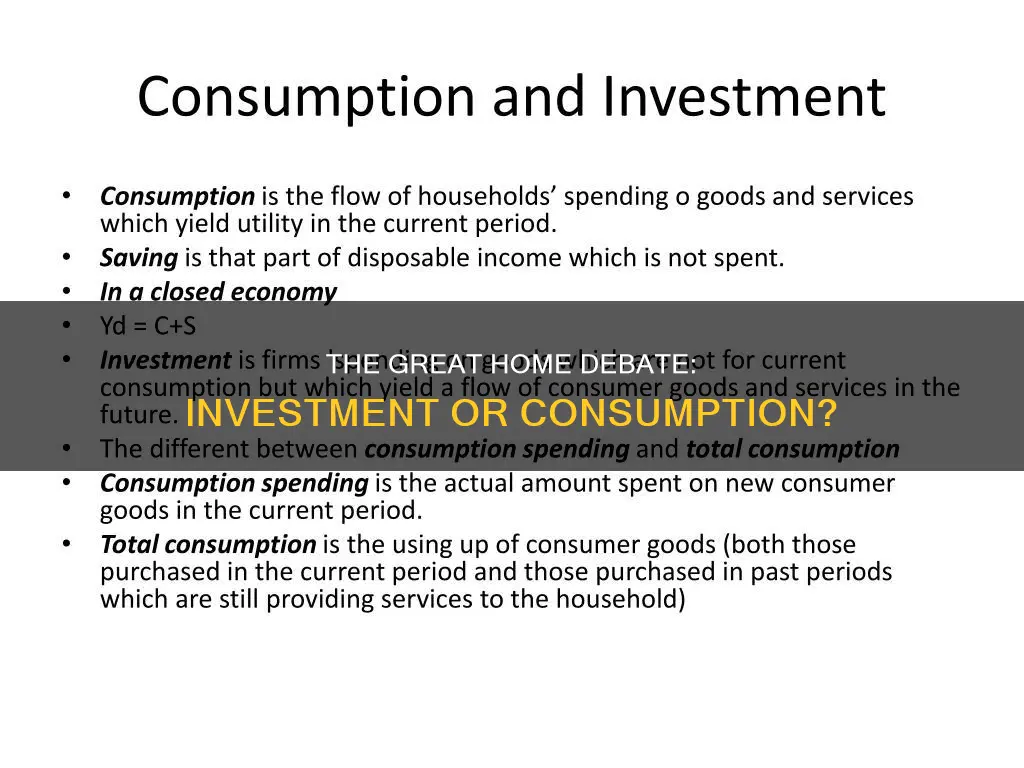
There are conflicting views on whether buying a house is an investment or consumption. Some people believe that a house is an investment because it can increase in value over time, while others argue that it is consumption because it provides a place to live and may not generate a profit.
Those who view a house as an investment may consider the potential for appreciation in value and the opportunity to sell it for a profit. On the other hand, those who see it as consumption prioritise the function of a house as a place to live and recognise that selling it would require finding another place to reside. Additionally, there are carrying costs associated with homeownership, such as mortgage payments, taxes, insurance, and maintenance, which can offset any potential gains.
Some people differentiate between a primary residence and investment properties, considering the former as consumption and the latter as an investment. The distinction is based on the purpose and usage of the property rather than its inherent nature.
Overall, the perspective on whether a house is an investment or consumption depends on individual circumstances, priorities, and financial goals.
| Characteristics | Values |
|---|---|
| Primary purpose | Providing a place to live |
| Sale | Depends on the market and personal circumstances |
| Equity | Can be trapped |
| Borrowing money | Creates a liability |
| Carrying costs | Too high to be an investment |
| Cash flow | Only if rented out |
| Appreciation | Not guaranteed |
What You'll Learn

A house is a capital good
A house can be considered a capital good under certain circumstances. A capital good is any physical asset used for production by businesses to produce goods or services for consumers. Capital goods are man-made products that can include items like buildings, machinery, and tools.
A house can be a capital good if it is used by a business to produce goods and services. For example, a hotel would be considered a capital good. In most cases, however, a house would be considered a consumer good, as it is primarily purchased to reside in.
In the context of national income accounting, the purchase of a house by a household is sometimes treated as an investment. This is because the house produces a stream of housing services, which can be considered a form of capital good. This treatment is a convention in national income accounting to ensure consistent comparisons between countries or over time, as the homeownership rate can vary across countries and periods.
It is important to note that only the structure of the house is considered an investment in this context, excluding the land it is built on and any consumer durables that come with the home.
The Great Debate: Paying Off Loans vs. Investing — Where Should Your Money Go?
You may want to see also

A house is a long-term investment
A house is a capital good, meaning it is used to produce other goods and services. In this case, it produces a stream of housing services, such as shelter, security, and an address. This makes a house an investment, and its purchase may be regarded as such.
However, the definition of investment can be fuzzy, and there are grey areas. For example, while a house is considered an investment, other consumer goods like a TV are not. This is because a house has a much higher value and a longer lifespan than most consumer durables.
When people refer to their house as an investment, they often mean that it is a good way to build wealth. While this is true, it is important to remember that a house is first and foremost a place to live. This means that you will likely sell it when it no longer fits your lifestyle, rather than when it is most convenient from a return on investment perspective. As such, a house should be bought primarily as a place to live, and any potential profit made from its sale should be seen as a bonus.
There are several other reasons why a house may not be considered a good investment:
- The prospect of an increase in value is not enough to make a house a true investment. The only way to profit from an increase in value is to sell the house, which means finding another place to live. Unless you downgrade to a less expensive house or move to a rental, you won't make a profit.
- Borrowing money against the value of your house through a home equity line of credit (HELOC) or a cash-out refinance can put your house at risk. If house values decline, you may find yourself unable to refinance to lower monthly payments or sell to move to a less expensive home.
- The carrying costs of owning a home are high. In addition to monthly mortgage payments, you also have to pay real estate taxes, homeowners' insurance, private mortgage insurance, and utilities. There are also repair and maintenance costs, which can include replacing the roof, siding, windows, doors, carpets, and flooring, as well as remodelling kitchens and bathrooms.
- A house does not generate cash flow. Unless you own an investment property and rent it out, your house will not provide any form of cash flow.
- Appreciation is not guaranteed. During the financial crisis of 2008, property values fell in many markets, and some fell spectacularly.
In conclusion, while a house can be considered a long-term investment, it is important to remember that its primary purpose is to provide you with a place to live. Any potential profit from its sale should be seen as a bonus rather than the main goal.
Oil: Invest Now for Future Gains
You may want to see also

A house is a depreciating asset
While some people may argue that buying a house is an investment, others disagree and believe that a house is a depreciating asset. This is because, unlike other investments, a house does not generate wealth for society. Instead, it is a lifestyle expense, similar to transportation. The physical structure of a house, like a car, is a depreciating asset that requires constant maintenance and repair, which are expenses. These costs of maintenance and repair must be factored into the overall cost of the house. Additionally, even when a mortgage is paid off, there are still costs associated with maintaining, insuring, and paying taxes on the home. Therefore, the larger the physical house, the more it will cost to maintain.
However, it is important to note that the land on which the house is built tends to appreciate in value. This is why the three most important factors in real estate are location, location, and location. It is the potential long-term value of the land, not the physical house, that makes real estate a possible investment opportunity.
In conclusion, while a house may be considered an investment by some, it is more accurately viewed as a depreciating asset due to the ongoing maintenance costs and the need for updates to maintain its resale value.
Venture Cultivation: The Power of Investing Time in New Business Endeavors
You may want to see also

A house is a place to live
There are differing opinions on whether buying a house is an investment or consumption. Some people believe that a house is a place to live and that its primary purpose is to provide shelter, making it a consumption decision rather than an investment. Others argue that a house is an investment because it can appreciate in value over time.
Those who view a house as a consumption decision argue that it is not an investment because its primary purpose is to provide a place to live, and one cannot do without it. This means that the sale of the house is often driven by factors such as lifestyle changes rather than investment returns. Additionally, the carrying costs of owning a home, such as mortgage payments, taxes, insurance, and maintenance, are typically higher than those of other investments. These costs can offset any potential gains from appreciation, especially when considering the opportunity cost of investing the same amount of money elsewhere.
On the other hand, those who view a house as an investment highlight the potential for appreciation and the ability to borrow against home equity. They argue that a house is an asset that can increase in value over time, and this appreciation can be realized through a sale. However, this view has been criticized as it does not account for the costs associated with owning a home, such as maintenance and the need to find another place to live after selling.
Ultimately, the decision to buy a house depends on various factors, including financial circumstances, personal preferences, and market conditions. While a house can appreciate in value and provide certain financial benefits, it is essential to recognize that it also serves a fundamental need for shelter, which may influence the decision-making process.
Retirement Plans and Investment Advisors: A Necessary Partnership?
You may want to see also

A house is not an investment if you don't plan to sell it
The idea that a house is an investment comes from the fact that, historically speaking, real estate values tend to increase over time. However, there are several reasons why a house may not be considered an investment.
Firstly, a house has a more important primary purpose: to provide you with a place to live. Therefore, you will have little control over its sale from an investment perspective, as you will likely sell it when it no longer fits your lifestyle, rather than when it is convenient in terms of a return on investment.
Secondly, a house can only be considered an investment if you plan to sell it. While houses generally increase in value over time, the only way to profit from this increase is to sell the property. However, selling your house means you will have to find another place to live, and you may have to use the equity obtained from the sale to fund this purchase, trapping your equity.
Thirdly, equating your house to an investment can lead to equity stripping. You can borrow money against the equity in your house through a home equity line of credit (HELOC) or a cash-out refinance of your first mortgage. However, this creates a corresponding liability, which may put your house at risk.
Additionally, the carrying costs of owning a home are too high for it to be considered an investment. When you purchase an investment, you typically do not need to put more cash into it for it to make money for you. In contrast, a house requires monthly mortgage payments, real estate taxes, homeowners insurance, private mortgage insurance, and utilities. Houses also need ongoing repairs and maintenance, which can cost thousands of dollars.
Finally, your house will not generate cash flow unless you own an investment property and rent it out. While buying and managing real estate investments can be lucrative, it takes a lot of work, money, and risk.
In conclusion, while a house may increase in value over time, it is not an investment if you do not plan to sell it. The primary purpose of a house is to provide shelter, and the carrying costs of owning a home are high. Therefore, it is essential to view a house as a place to live rather than solely as an investment.
Options: Why Investors Are Wary
You may want to see also
Frequently asked questions
It depends on your perspective. Some people view their house as a place to live and raise a family, while others see it as an investment opportunity.
The main argument for buying a house as an investment is the potential for future profit. Historically, real estate values tend to increase over time, so buying a house can be seen as a long-term investment strategy.
Those who view a house as consumption prioritise having a stable and secure place to live over potential future profits. They may also value the control and freedom that comes with owning their own home, such as the ability to decorate and renovate as they wish.
It's important to consider your financial situation, the housing market trends, and your personal goals and priorities. If you're primarily interested in potential profits, you may want to treat it as an investment. However, if you're looking for a stable place to live and are not concerned with short-term gains, you may view it as consumption.







